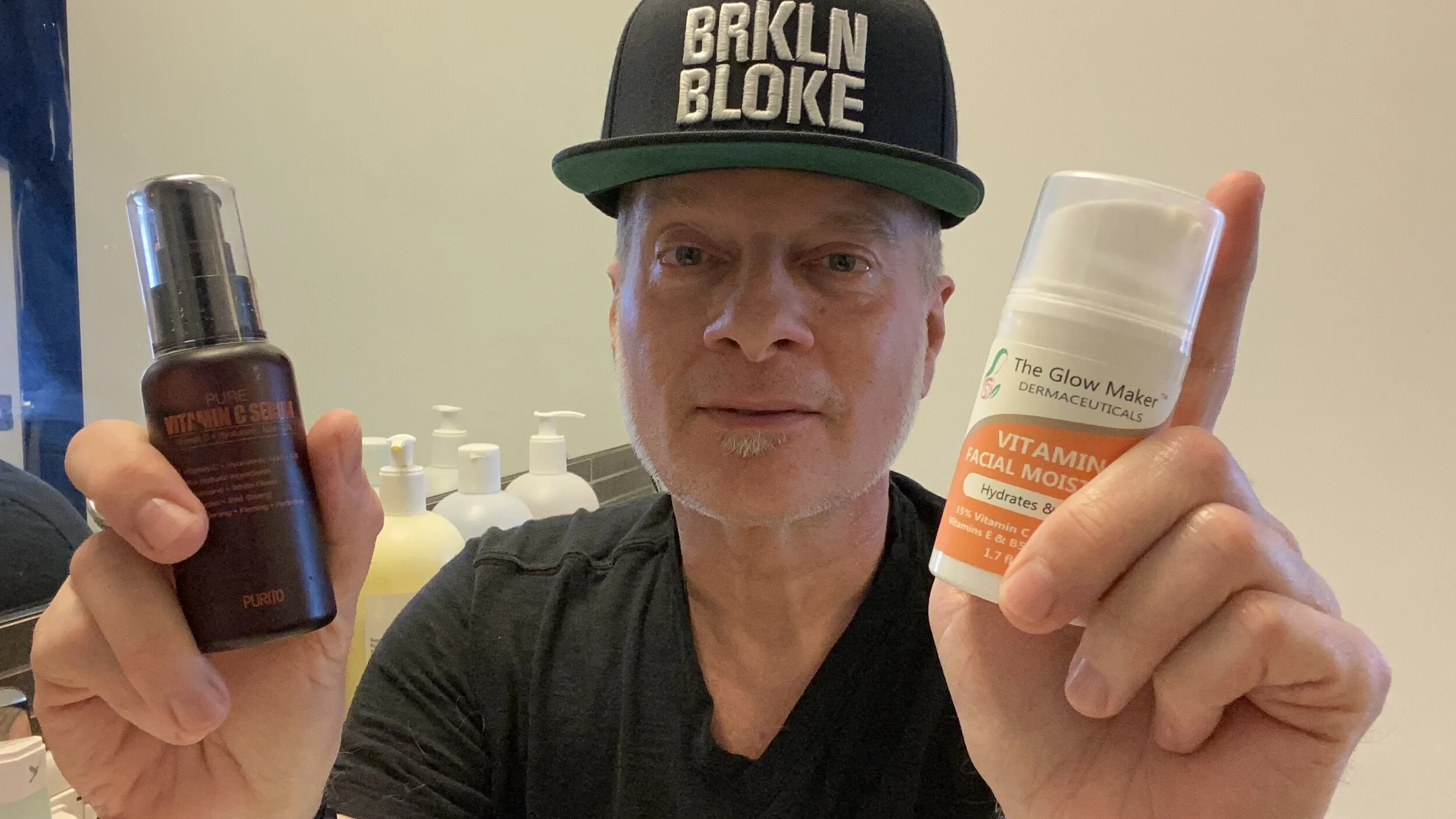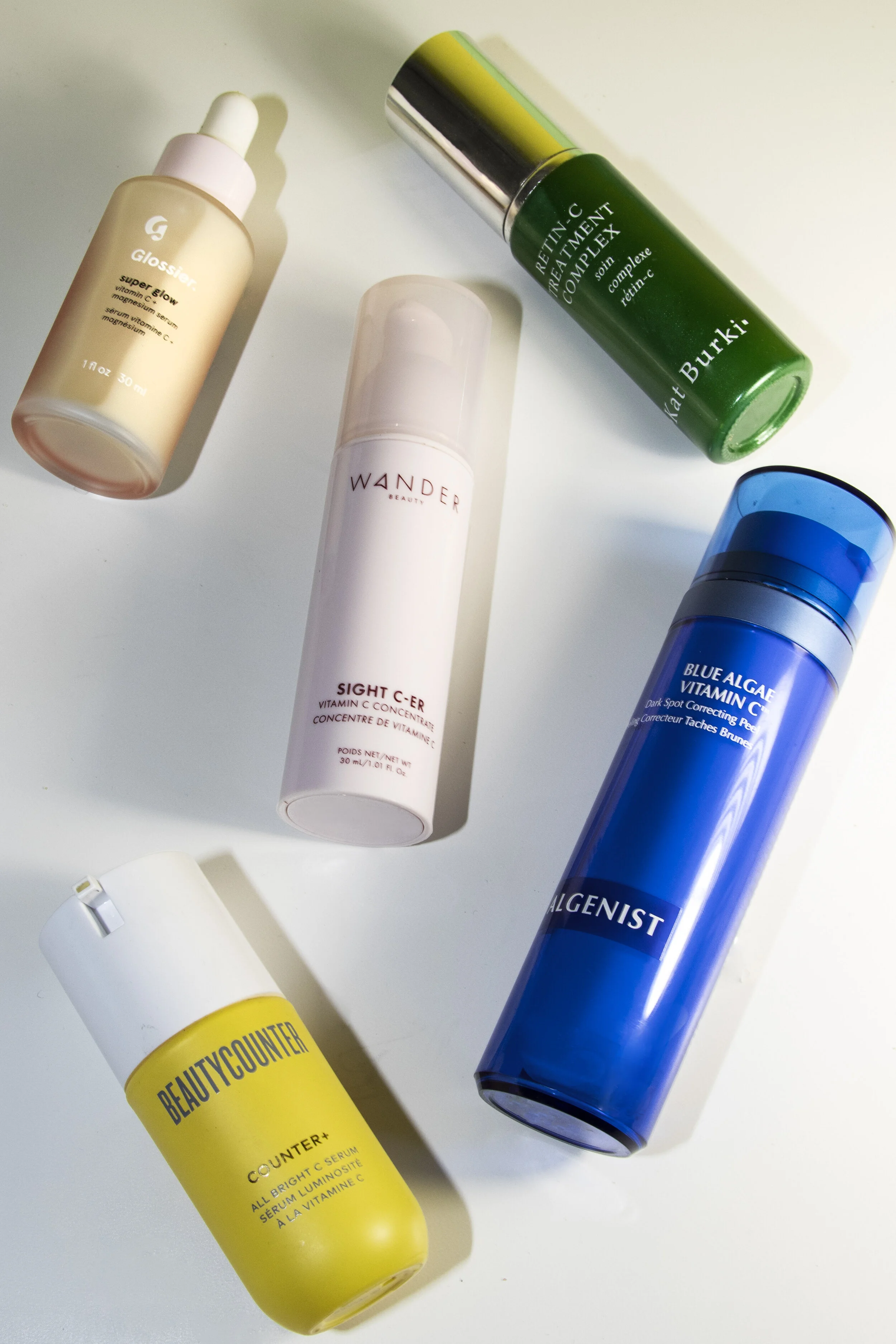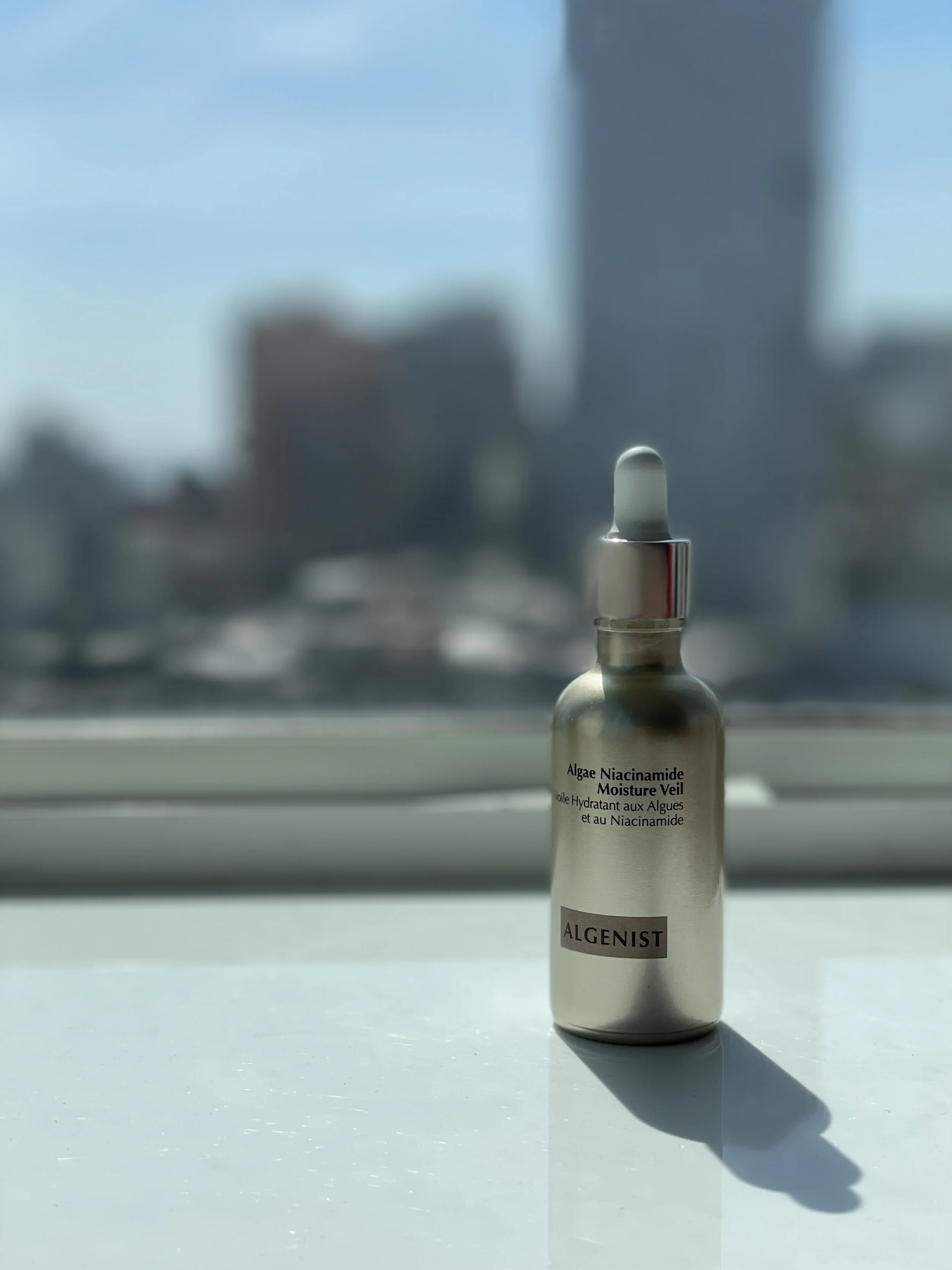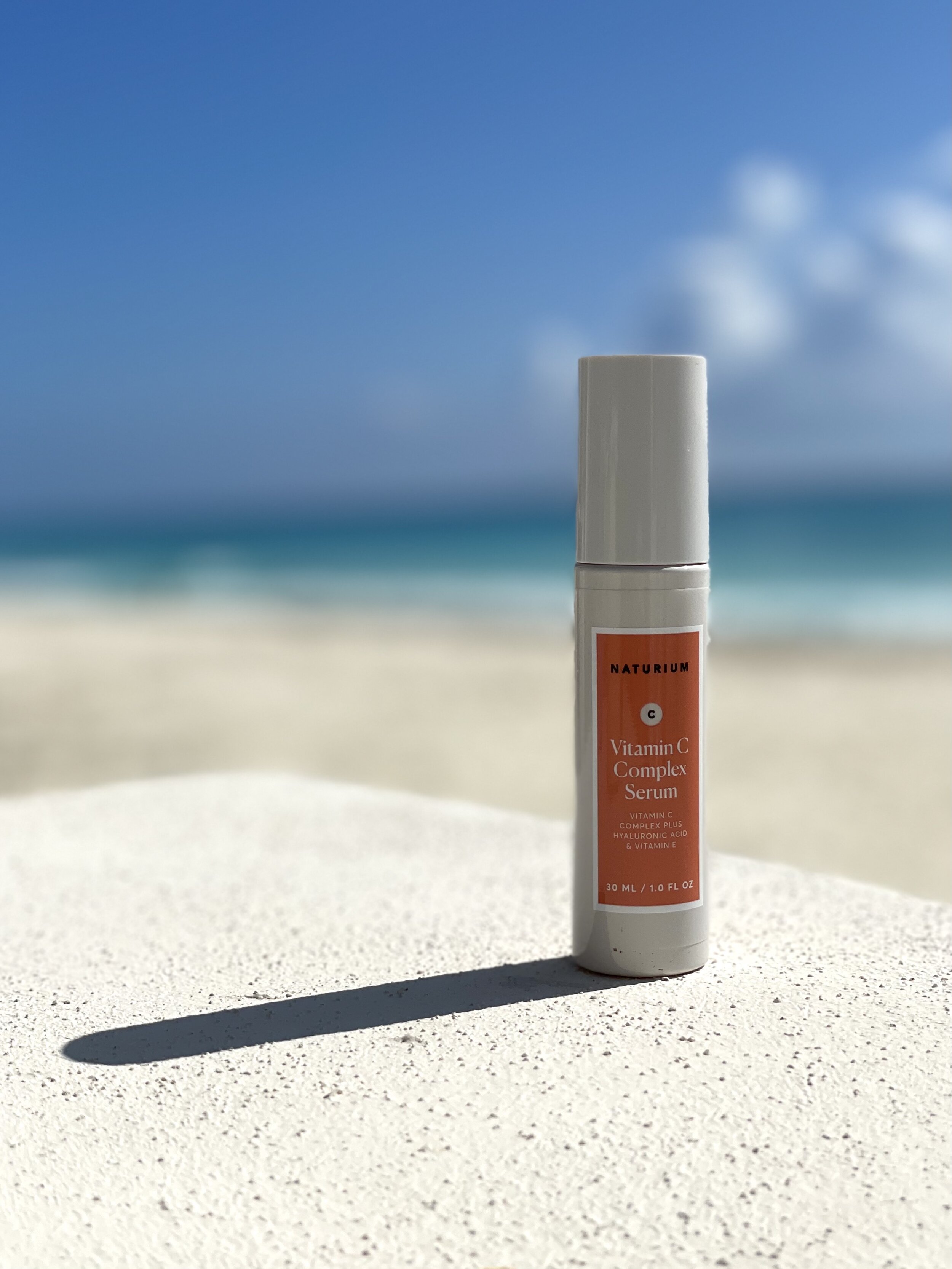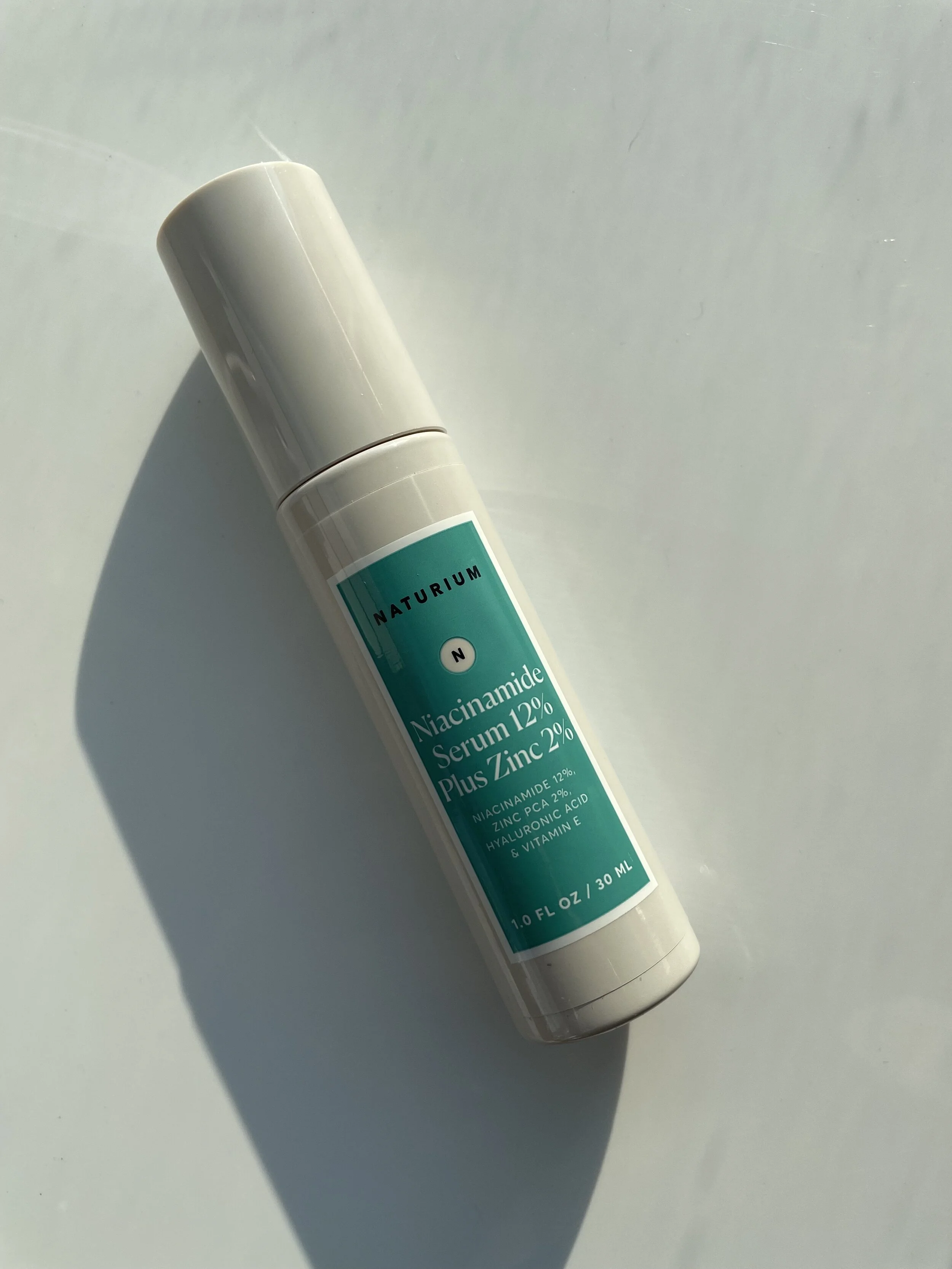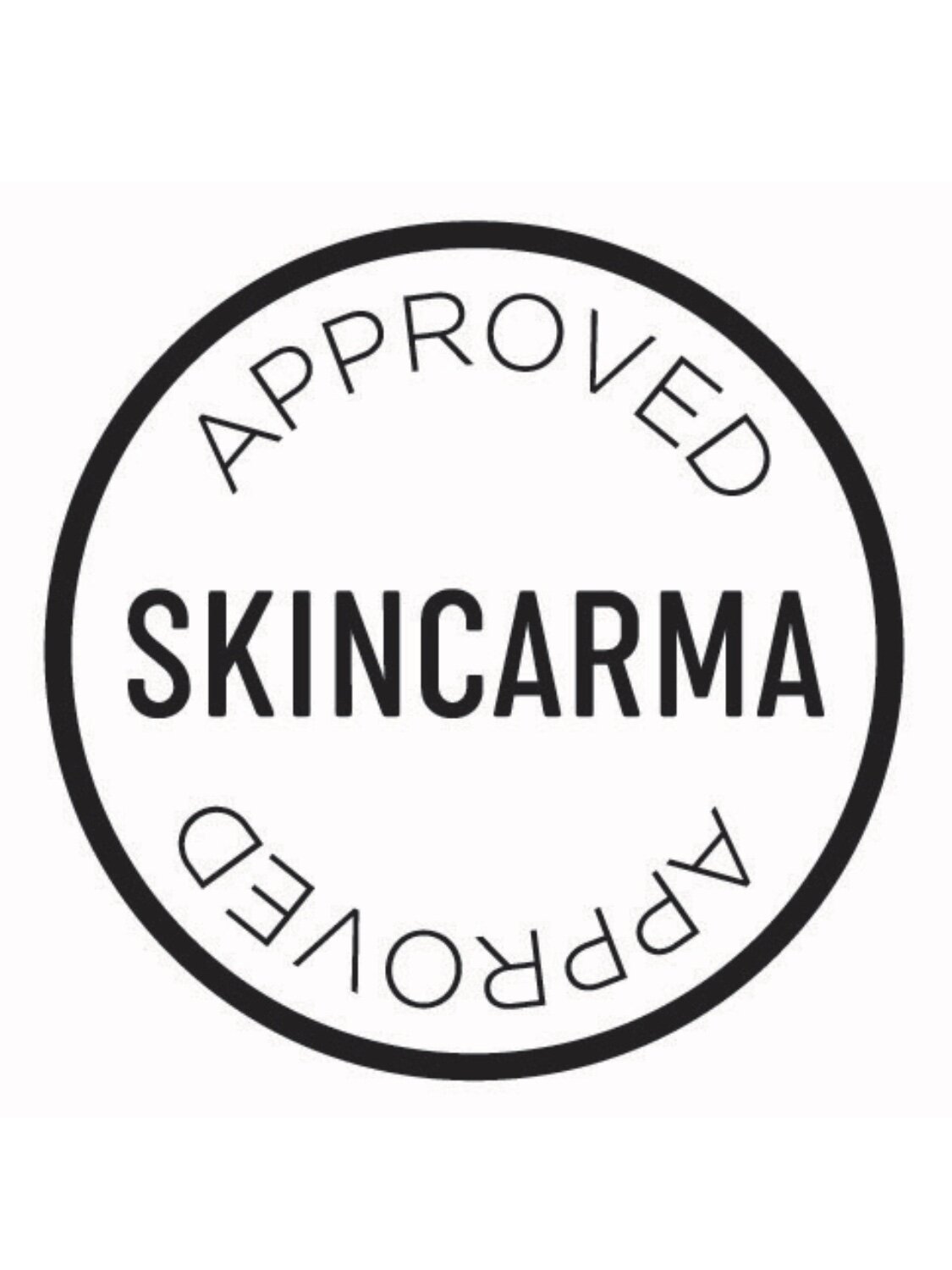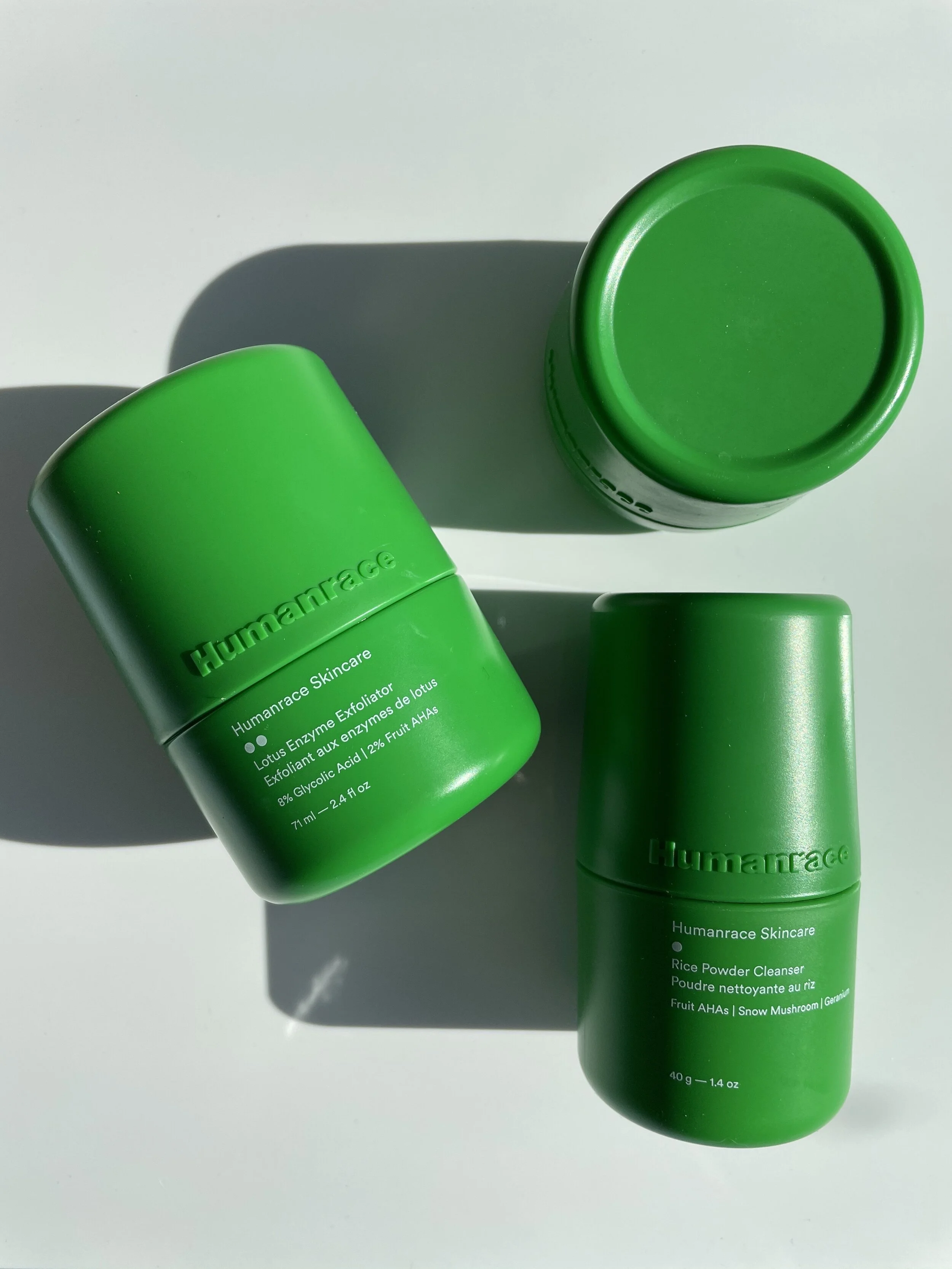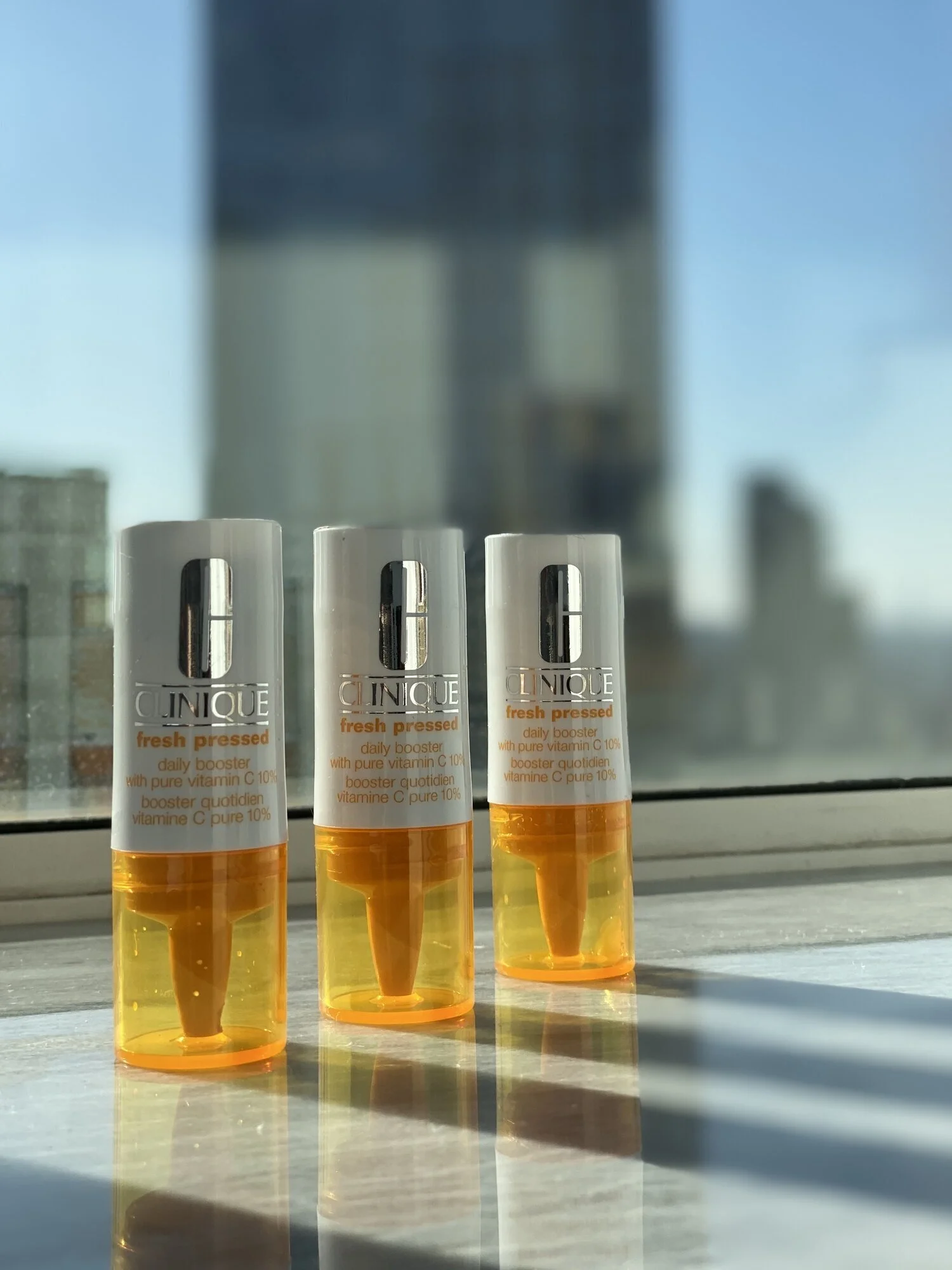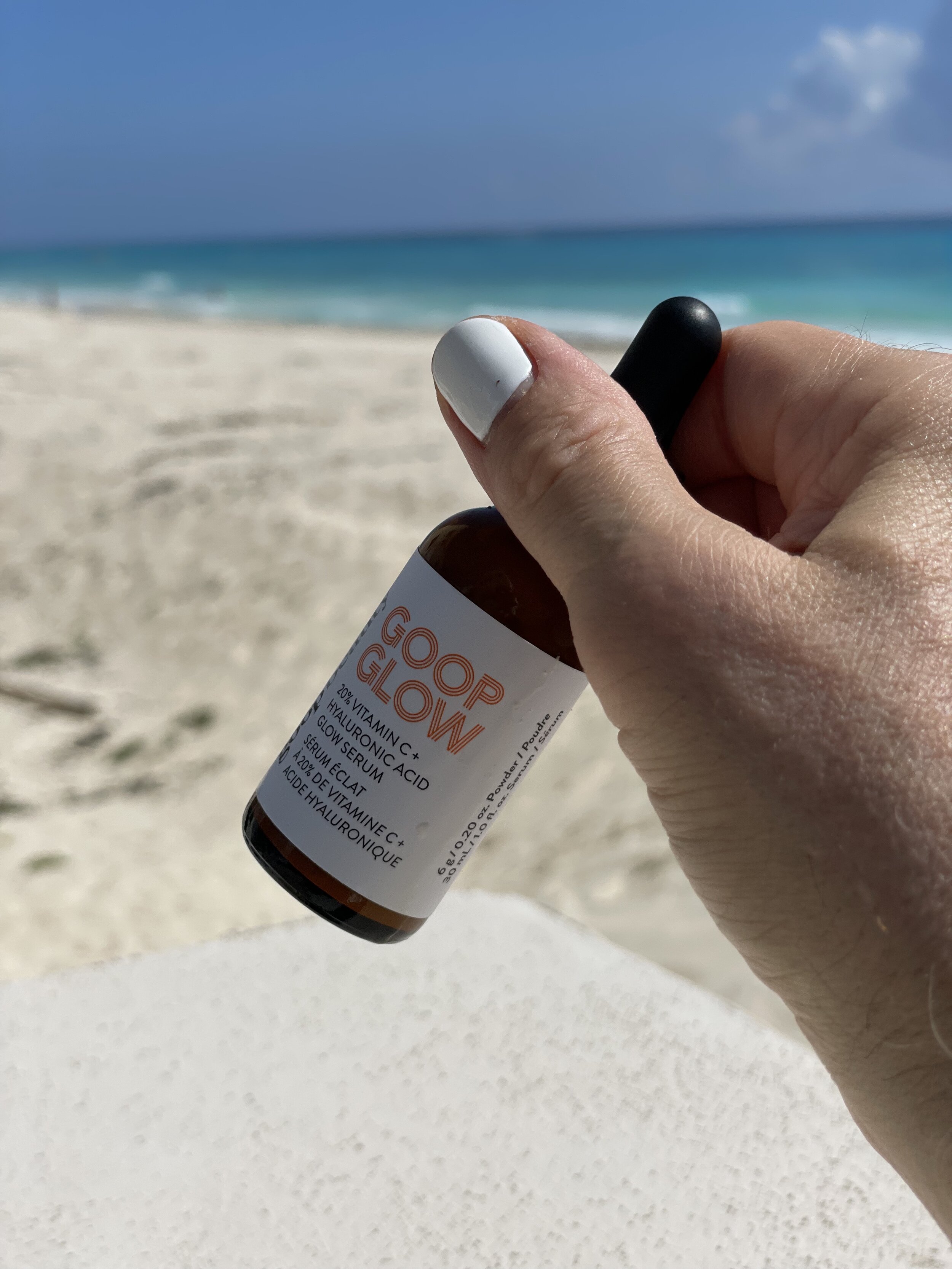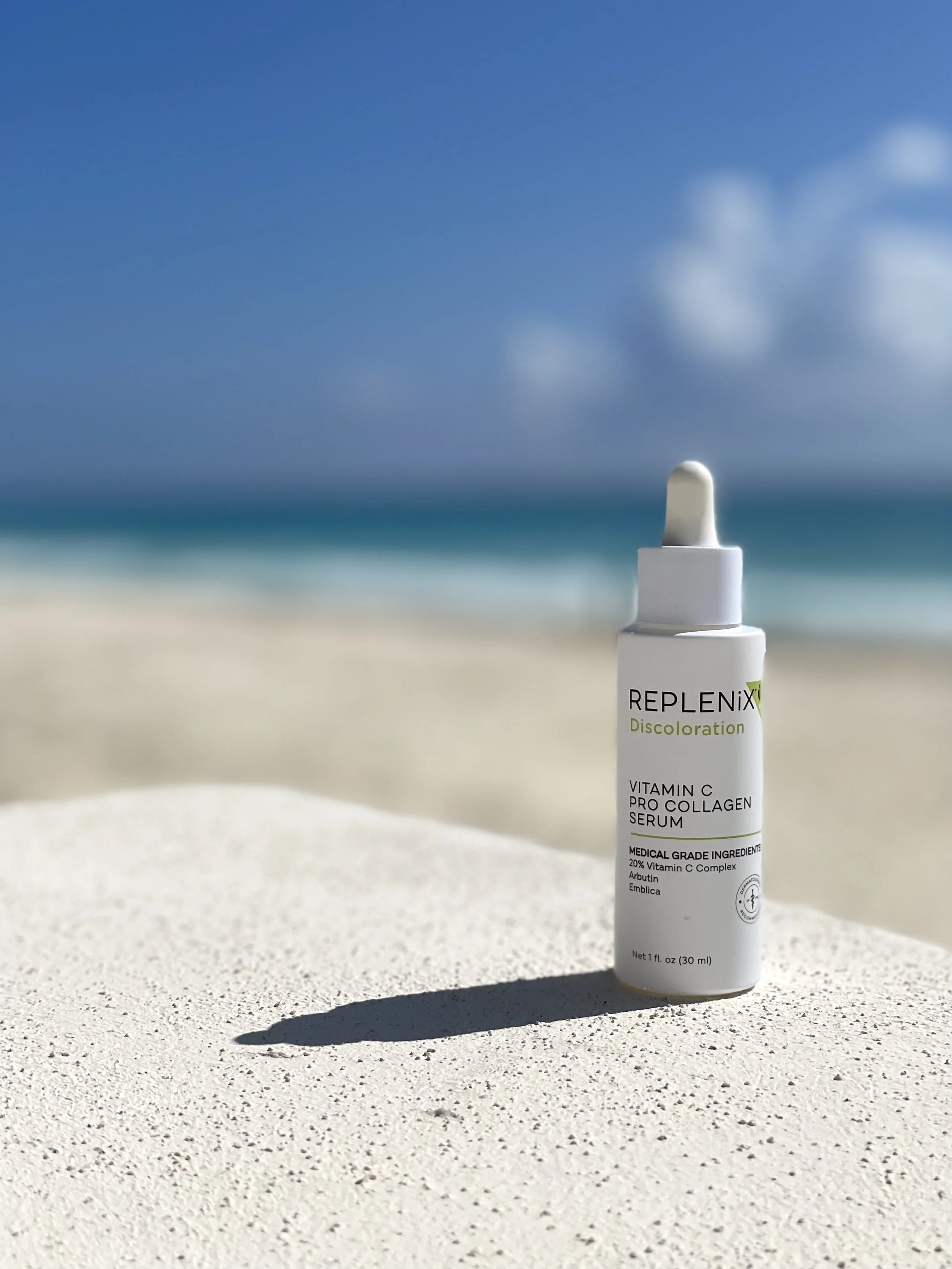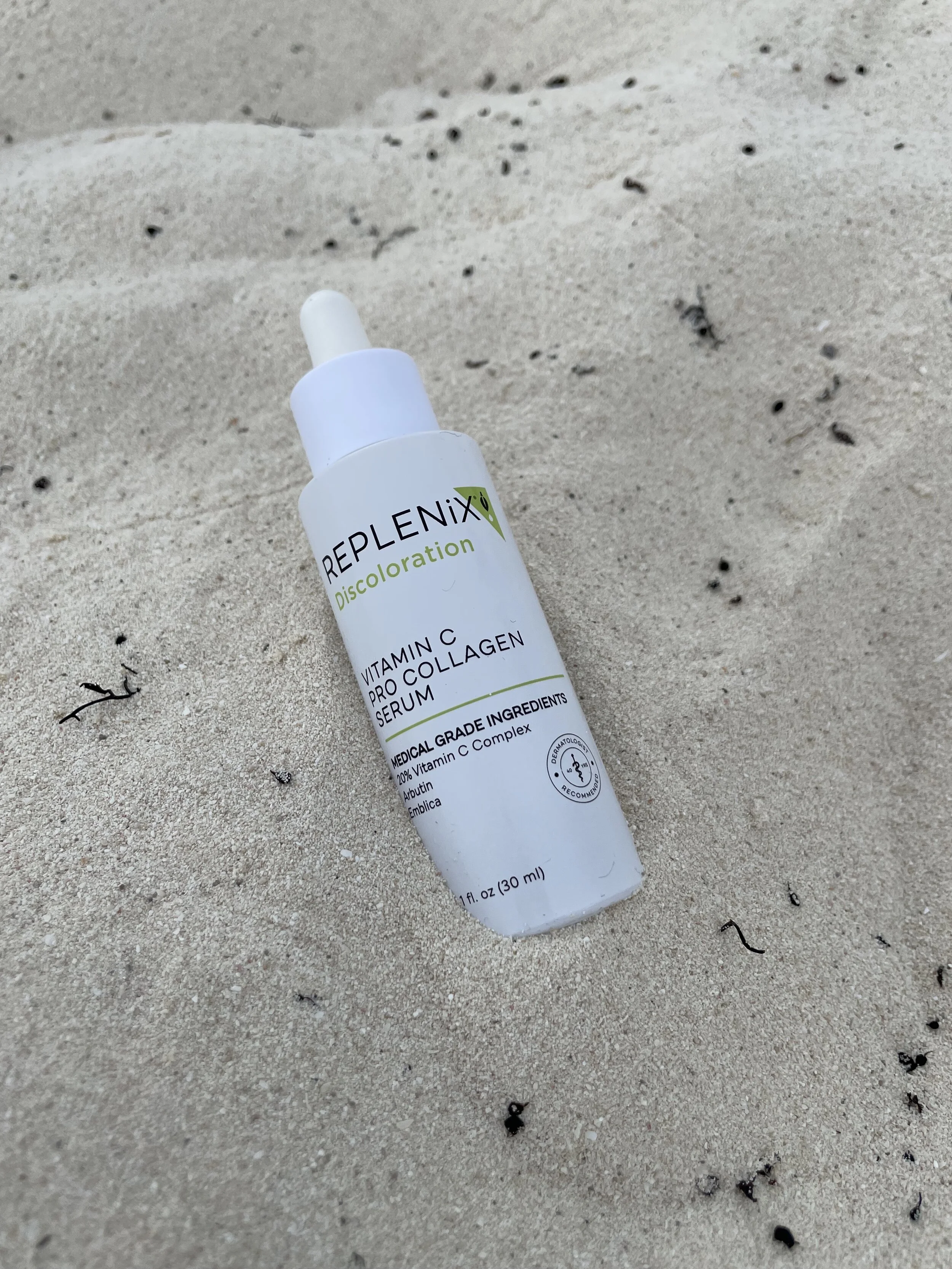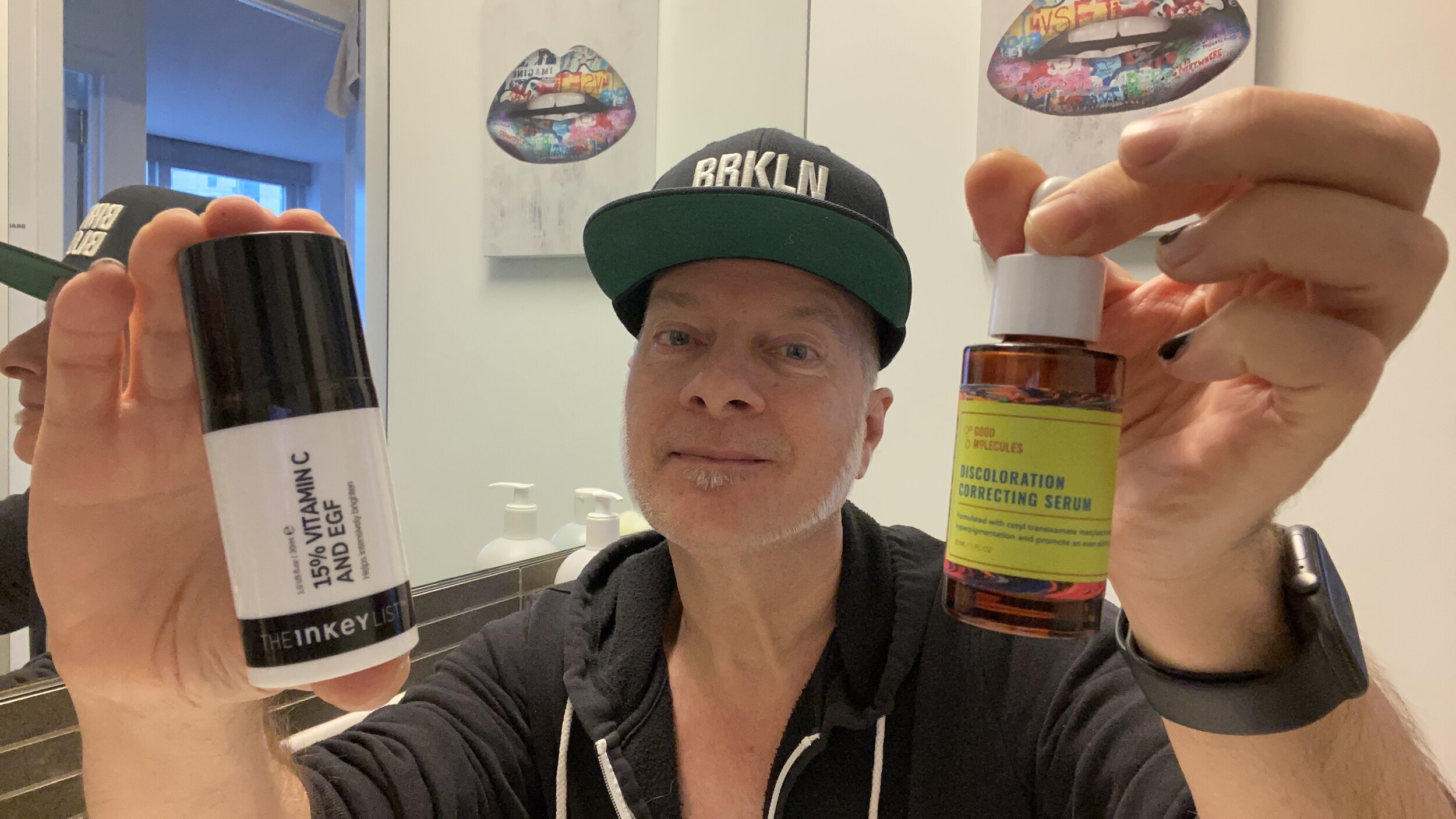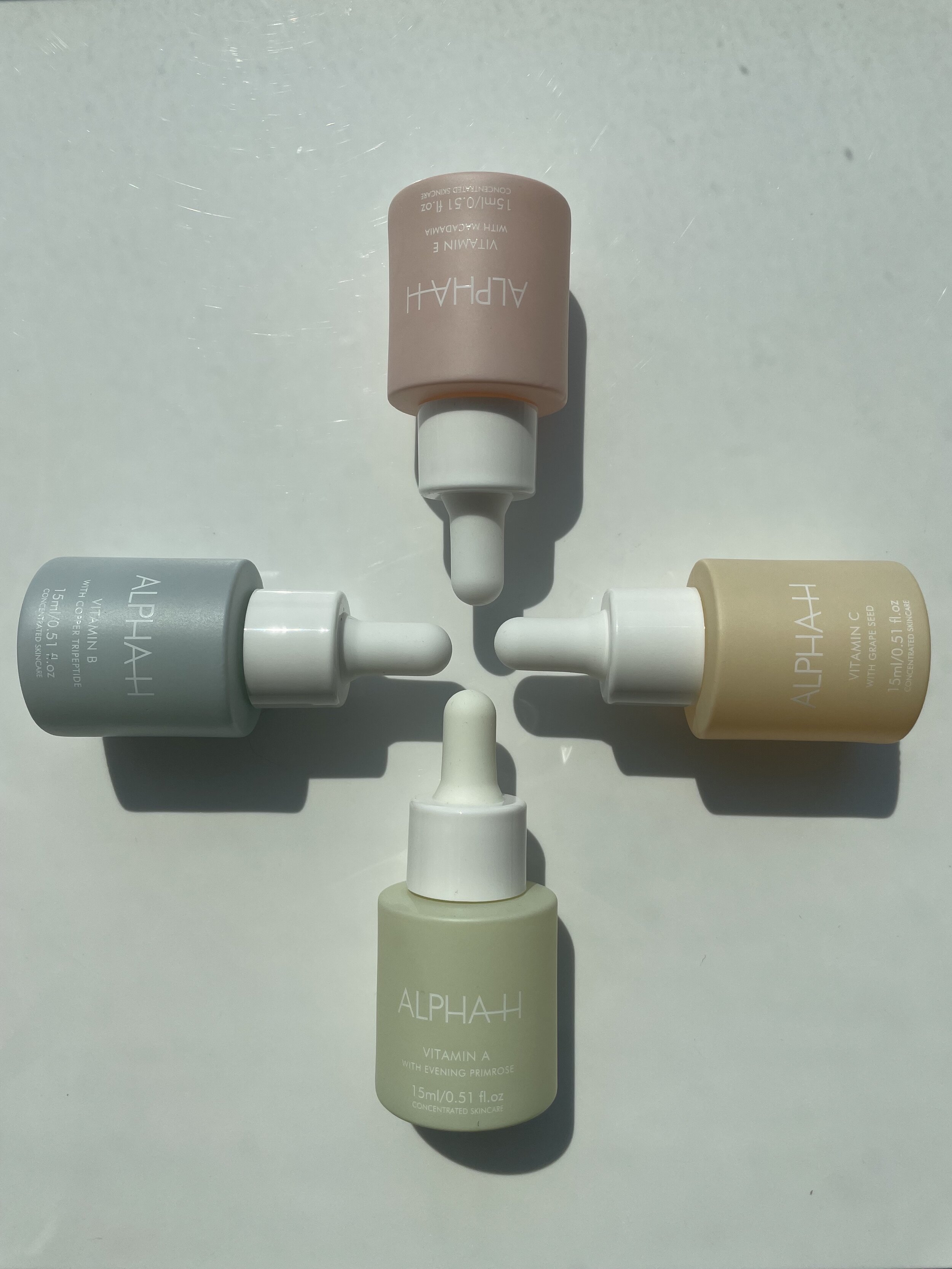MY TOP VITAMIN C PICKS FW21: NEW VITAMIN C SERUMS I’M CRUSHING ON FROM ALGENIST, NATURIUM, GOOP GLOW AND MORE - BEST VITAMIN C SERUMS, BEST BRIGHTENING SERUMS
I just returned from one of the most relaxing vacations I’ve had in a long, long time.
A buddy and I hopped on a flight to Cancún, Mexico, for five days of complete nothingness at an Airbnb by the ocean.
We cooked a lot. We ordered from a local vegan restaurant. We did yoga on the beach. And we rewatched Squid Game just because.
It was heaven and sorely needed.
I’ve taken on so much work lately (yes, that’s a good thing!) and had been really feeling the stress of it on my psyche, the weight of it on my shoulders. In fact, if I’m being honest, I may have taken on too much.
But hey, at least I’m busy writing! I’m super grateful to love the work I do and to always have enough of it to sustain me. This reminds me once again of my favorite quotation about passion and life — from the second-generation family founder of Kiehl’s, Mr. Aaron Morse.
“Love what you do. And that’s the trick of life. Love what you do, put your heart into it and you will be rewarded.”
The skincare stuff starts here.
There are two ingredients that I wish everyone on Earth who’s serious about their skin health would incorporate into their own skincare routines — Vitamin C and Vitamin B3, or Niacinamide. Both are indispensable antioxidants — and much, much more. In the case of a good Vitamin C treatment, it can be one of the best anti-aging serums in your arsenal.
Yes, like sunscreen, antioxidants are anti-aging. And you can’t get enough of them in your skincare and in your skin.
Back in my time working at Kiehl’s as the company’s first-ever copywriter, the marketers didn’t understand the value of antioxidants. In fact, no one really did. Antioxidants like Vitamin C were considered “preventable”; that is, they prevented signs of aging. They were marketed to young women in their 20s. As if everyone at every age isn’t interested in preventing signs of aging. We all know it can get worse!
What Are Antioxidants and What Do Antioxidants Do for Skin?
Antioxidants possess numerous benefits for the skin, including preventing skin damage and multiple signs of aging. There’s an excellent article from the experts on the Paula’s Choice Research Team titled, How Antioxidants Fight the Signs of Aging that you can catch here. This is what I found most insightful:
Antioxidants for Skin Benefits
Antioxidants play a unique role when it comes to diminishing the appearance of fine lines and wrinkles. Years of environmental damage (including unprotected sun exposure—one more reason to apply that broad-spectrum sunscreen!) slowly chip away at skin’s natural ability to look and feel healthy. As this damage builds up, skin gradually loses its ability to recover and bounce back as it once did. It’s not an exaggeration to say that after years of damage, skin becomes overwhelmed, and its “look young systems” begin to slow down.
Antioxidants in skin care step in to help shield skin’s surface from further deterioration by calming stressed skin and defending against the visible effects of pollution —something all of us encounter on a daily basis.
What happens as a result of applying antioxidants to your face is truly impressive: Skin’s appearance begins to turn around! It regains a firmer feel and more even skin tone—and those wrinkles you’re probably not fond of will visibly soften.
The Best Vitamin C Serums and Face Creams
Until very recently, Vitamin C was perhaps the most under-appreciated of all skincare ingredients. Mainly because it seemed to be old news. And marketers don’t push what’s old; they spend their marketing dollars on what’s new, fresh, sexy and innovative — whether it works or not. Their job is to make you believe what they’re pushing does.
Not so long ago, antioxidant Vitamin C was really tough to formulate with. It’s been nearly impossible to keep high levels of Vitamin C stable in a skincare formula. The truly effective levels weren’t possible. Until you get to ten percent or more, you don’t really get the power-brightening, collagen-building benefits that Vitamin C has to offer.
Right at the start of summer, I published my first article of the year on my favorite Vitamin C serums of 2021 in a piece titled, Collab with Antonio Jefferson Studio: New Vitamin C Serums I’m Crushing on from Wander Beauty, Glossier, Kat Burki and More – which you can catch here. It was a collection of the latest and greatest Vitamin C serums, brightening face oils, anti-aging lotions and I’d say, the best dark spot treatments out there.
COLLAB WITH ANTONIO JEFFERSON STUDIO: NEW VITAMIN C SERUMS I’M CRUSHING ON FROM WANDER BEAUTY, GLOSSIER, KAT BURKI & MORE
Among my top picks were some of my favorite brightening Vitamin C serums to this day, the turmeric-infused Beautycounter Counter+ All Bright C Serum, the Wander Beauty Sight C-er Vitamin C Concentrate and Glossier Super Glow Vitamin C + Magnesium Serum — one of the best Vitamin C serums for oily skin.
Also in the mix were the Kat Burki Retin-C Treatment Complex and Algenist Blue Algae Vitamin C Dark Spot Correcting Peel — a really wonderful brightening peel that’s perfect for reinvigorating your complexion on #selfcaresunday.
What Does Vitamin C Do for Skin?
There’s an excellent article on the remarkable benefits of Vitamin C for the skin from the experts on the Paula’s Choice Research Team titled, What is Vitamin C and How Does it Benefit Skin?
Vitamin C is one of the most exciting, research-proven ingredients you can apply to skin. This water-soluble antioxidant is a natural component of healthy skin. When we’re young, vitamin C levels in skin’s outermost two layers (epidermis and dermis) are abundant, but as we age, these levels naturally deplete. Unprotected sun exposure (UV damage) and pollution can accelerate this decline, leading to skin looking and feeling dull, uneven, and less firm than it once was.
Luckily, there are topical skin care solutions that can help mitigate this damage, so skin looks and feels healthier and younger longer.
Vitamin C Benefits for Skin
Vitamin C’s benefits for skin are vast, including its ability to even out skin tone and diminish the appearance of fine lines and wrinkles. While this powerhouse ingredient is well-known for its skin-brightening benefits, research also shows it can shield skin from the visible impacts of environmental stressors, including free radical damage. This synergy of mitigating problems both before and after they occur makes vitamin C a force to be reckoned with.
When and How to Use Vitamin C in Your Skin Care Routine
All forms of vitamin C mix well and layer with other skin care ingredients, including exfoliating acids and other vitamins and antioxidants, such as retinol and niacinamide (11, 12).
Vitamin C can be used twice daily, both morning and night. After cleansing, toning and exfoliating, apply the rest of your products in order from thinnest to thickest texture (commonly: serum, moisturizer, treatments). During the day, always finish with a moisturizer with broad-spectrum SPF 30 or greater.
WATCH MY VIDEO REVIEW
MY 2021 VITAMIN C PICKS + THE BEST VITAMIN C SERUMS TO BRIGHTEN UP THE COMPLEXION!
ON MY YOUTUBE CHANNEL HERE
With the understanding that Vitamin C can be a real game changer for your skin health (and your complexion!), let’s take a look at five of the best Vitamin C serums that I’ve been crushing on over the last several months.
Meet my top picks of Vitamin C serums for FW21…
Algenist | Blue Algae Vitamin C Skinclarity Brightening Serum
I first featured this remarkable new Vitamin C serum from bio-tech brand Algenist on my IG page a month ago on #skincarmasaturday — when I share a glimpse of my new skincare discoveries of the week.
In fact, one of my favorite new brand crushes this year has been Algenist. The original bio-science brand is constantly innovating by creating new ways to address old problems — like dull skin and hyperpigmentation. That means introducing new products and even inventing new ingredients.
There aren’t many brands out there that invent entirely new ingredients for their own formulations. Most skincare ingredients are purchased from the same ingredient manufacturers. If you want Bakuchiol for your formula, you contract with a place like Texas Natural Supply. A 640 oz jug (40 lbs) of Bakuchiol will cost you $844.80.
I’m sure if Algenist wanted Bakuchiol, that’s how they’d get it. But they were looking for a breakthrough form of Vitamin C that could deliver on the kind of benefits the brand strives for — visible benefits in ten days.
Trouble reducing dark spots and hyperpigmentation? It’s especially problematic if you have a darker skin tone. If that’s you, I’ll bet you haven’t found a brightening serum that you think works well enough yet. Algenist knew that and set out to make the best Vitamin C serum for dark spots and hyperpigmentation.
The brand has been an innovation machine. And one of my favorite Algenist formulas of 2021 is their Algae Niacinamide Moisture Veil, perhaps the best Niacinamide serum for oily skin that I’ve come across. It pairs perfectly with Algenist’s new Blue Algae Vitamin C Skinclarity Brightening Serum. (And yes, Vitamin C and Niacinamide go well together!)
PRODUCT REVIEW: ALGENIST ALGAE NIACINAMIDE MOISTURE VEIL - BEST NIACINAMIDE SERUM FOR OILY SKIN
Do Vitamin C and Niacinamide Go Together?
With the combination of Vitamin C and Niacinamide in the Wander Beauty Sight C-er Vitamin C Concentrate, you may be wondering if the two work in combination. Well, contrary to the urban myth that Vitamin C and Niacinamide don’t play well together, Viamin C actually loves Niacinamide. There is a huge misunderstanding that the two powerful antioxidant vitamins somehow deactivate one another or worse, cause irritation.
It’s time to put that myth to rest.
There’s an excellent article from the Paula’s Choice Research Team titled, Can Niacinamide and Vitamin C Be Used Together? — available on the brand’s site to read in full here. This is what I found most salient:
The studies showing incompatibility between niacinamide and vitamin C date back to the early 1960s (yes, that far). These studies were off from the start because they used non-stabilized forms of both ingredients, whereas both ingredients are typically stabilized when used in modern-day cosmetics formulas.
Niacinamide is a pretty “tough” ingredient; light and air don’t have the same effect on it as they do on antioxidants like vitamin C. What’s important for niacinamide is that the product be formulated at a pH that’s close to neutral. Vitamin C (pure ascorbic acid), on the other hand, does best in a low-pH (acidic) environment. However, nicotinic acid—the undesirable by-product of niacinamide and vitamin C—becomes an issue only when the niacinamide and vitamin C are combined in a high-temperature environment for a long time. That temperature is higher than you’d find in most at-home scenarios, including leaving a box of skin care products sitting outside in the sun for a couple of days.
Also, it’s important to point out that this concern applies only to pure vitamin C, not to its many other forms (such as magnesium ascorbyl phosphate, tetrahexyldecyl ascorbate, and ascorbyl glucoside). So, to reiterate, combining ascorbic or l-ascorbic acid with niacinamide is fine.
In short, any studies that show a definite issue from combining niacinamide and vitamin C were conducted in an environment that does not reflect what average skin care products experience during development, manufacturing, or in real-world storage and usage.
The Algenist Blue Algae Vitamin C Skinclarity Brightening Serum was made with an exclusive, patented form of pure Ascorbic Acid, one that Algenist invented and recreates in their labs.
Blue C (or Blue Algae Vitamin C) was originally sourced from spirulina and is sustainably regenerated as needed. No resources are taken from the Earth. Even the resultant bio-matter is repurposed for other uses. Honestly, how many brands can say that?
According to Algenist, “most importantly, it’s proven to outperform widely used synthetic forms of Vitamin C and Vitamin C derivatives and is ideal for all skin types and skin tones, including melanin-rich skins.”
Again, any brands you know who can say that?
I love Skinclarity’s rich, nourishing, experiential texture and herbaceous aroma. Is it the spirulina? The marine ferment? Algenist’s signature Alguronic Acid? No matter, it’s super layer-able at the water-based serum step of your routine. My skin drinks it up!
Skinclarity has quickly become one of my favorite Vitamin C serums of 2021. I’ve been through three bottles of it since it launched and the entire time I was in Cancún, it’s the Vitamin C serum I reached for most consistently.
What I like about it: Algenist’s Blue Algae Vitamin C Skinclarity Brightening Serum is such a pleasure to use and is super easy to layer. It also feels really nourishing on the skin.
What I don’t like about it: I don’t know the equivalent concentration of pure Ascorbic Acid in the the proprietary algae derivative. I’m not super attached to higher concentrations, but I do like to know as I layer many products in my routine.
Who it’s for: All skin types, but particularly oily skins that can’t handle a lot of oil or that can benefit from the balancing properties of the algae.
SHOP THE BLOG: Purchase the Algenist Blue Algae Vitamin C Skinclarity Brightening Serum for $72 here.
WATCH MY VIDEO REVIEW
2020’s BEST VITAMIN C SERUMS WITH THE ORDINARY, CLINIQUE, BEAUTY STAT & MORE!
ON MY YOUTUBE CHANNEL HERE
Naturium | Vitamin C Complex Serum
If you haven’t tried Naturium yet, I’m honored to introduce you to the brand! Naturium is a clean, affordable (make that super affordable!) skincare brand with the kind of “single-note” serums that have been popularized by brands like The Ordinary, Good Molecules and The Inkey List.
If you want to know more about this curious little brand that popped up out of nowhere, I found a great deep-dive into Naturium on the Allure website titled, 9 Naturium Skin-Care Products Our Editors Can’t Get Enough of.
Here is an excerpt:
Because the options are endless, consumers are becoming more discerning, more educated, and as a result, more determined to find products that actually work (and won’t cost them their entire rent check). It makes sense, then, why scientifically-backed, highly-effective, yet affordable brands like Naturium (available at Target) are finding huge success among skin-care newbies and devotees alike.
“Over the last couple of years, we’ve seen the interest in easy-to-digest skin-care education and results-driven products increase on social media,” Susan Yara, co-founder of Naturium, tells Allure. “What seemed to be lacking from the market was a brand that offered the education and the results, paired with elegant, well-rounded formulas and packaging at an accessible price.”
Yara should know — she’s been a popular beauty content creator for years, reviewing hundreds of skin-care products on her YouTube channel and listening closely to what her viewers were looking for to complete their skin-care regimens. “That’s what we offer with Naturium. Everyone that buys from us knows our products will work well, feel great, and fulfill our mantra that skin-care is self-care.” Naturium’s advising board-certified dermatologist Dr. Alexis Stephens supports Yara’s claim. “I like that Naturium makes highly effective, beautifully formulated products feel more accessible to everyday consumers. They use ingredients that are proven to help even skin tone, decongest pores, and encourage healthier skin in general. There’s a product that works for everyone,” Stephens tells Allure.
Over the last several weeks, I’ve been exploring several of the brand’s most popular, affordably priced serums. Not surprisingly, the Niacinamide Serum 12% Plus Zinc 2% is a personal fave.
With a solid 12% concentration of antioxidant Niacinamide, the Niacinamide Serum 12% Plus Zinc 2% has a silky, ever-so-slightly sticky texture. It makes sense since the formula pairs Niacinamide and Zinc — an ingredient with potential for regulating sebum in oily skin. It’s not off-putting and I really love the simple efficacy of the product.
PRODUCT REVIEW: NATURIUM NIACINAMIDE SERUM 12% PLUS ZINC 2% - BEST NIACINAMIDE SERUM FOR OILY SKIN,
Next up in my Naturium journey, I thought I’d give the brand’s three Vitamin C serums a try, starting with Naturium’s Vitamin C Complex Serum. It’s a water-based Vitamin C serum powered by a duo of pure Ascorbic Acid and the Vitamin C derivative, Sodium Ascorbyl Phosphate.
Notably, the Vitamin C Complex Serum formula also contains a healthy dose of Glutathione, a powerful antioxidant naturally produced by the body. At higher concentrations, Glutathione has a characteristic sulfuric odor, something Naturium has somehow managed to avoid here.
What is Glutathione?
According to the experts on the Paula’s Choice Research Team, Glutathione is a “powerful, non-enzymatic antioxidant which naturally occurs in the skin where it serves to help defend it against the visible effects of environmental damage. The gradual decline of the natural supply of glutathione in the body is believed to be a key marker of many outward signs of aging. Glutathione is a tripeptide comprised of three amino acids (cysteine, glutamic acid, and glycine), which work in unison to offer skin-restoring and brightening benefits when used in topical products.”
From my deep-dive of the formula’s INCI, I surmise that Naturium’s Vitamin C Complex Serum is formulated with a 5% concentration of Sodium Ascorbyl Phosphate. It’s ingredient number four, just ahead of Ascorbic Acid. By my estimation, the two combine for a 10% total concentration of brightening Vitamin C.
As you may know, there are multiple forms of Vitamin C available for use in skincare products. You’ve likely seen them in your ingredient lists. Some of the best Vitamin C serums for face are formulated with the purest form of Vitamin C, L-Ascorbic Acid, or just Ascorbic Acid. It’s the gold standard.
But there are numerous derivatives of Vitamin C that are just as effective at delivering antioxidant protection, brightening the complexion and even stimulating collagen production to plump skin from within to smooth the appearance of fine lines and wrinkles on the surface.
But, some forms of Vitamin C can even do more. The Sodium Ascorbyl Phosphate in Naturium’s Vitamin C Complex Serum is one of them. A compound of Ascorbic Acid with a phosphate and salt, it is considered among the best forms of Vitamin C for oily and acne prone skin.
Which Vitamin C Is Good for Oily Skin and Is Vitamin C Safe for Oily Skin?
There’s an excellent, thoroughly sourced breakdown of the unique benefits Sodium Ascorbyl Phosphate from the experts on the Paula’s Choice Research Team that you can catch on the brand’s website here. This is what I found most insightful:
Sodium Ascorbyl Phosphate Description
Sodium ascorbyl phosphate (SAP, for short) is a stable, water-soluble form of vitamin C made from combining ascorbic acid with a phosphate and a salt, compounds which work with enzymes in skin to cleave (split) the ingredient and release pure ascorbic acid, which is the most researched form of vitamin C.
Just like pure vitamin C, sodium ascorbyl phosphate functions as an antioxidant on and within skin. When used in higher amounts, it can be effective for brightening a dull skin tone, smoothing wrinkles, visibly firming skin, and reducing discolorations.
The usual concentration of sodium ascorbyl phosphate in skin care ranges from 0.2–3%, an effective range to help improve skin’s environmental defenses and target lines and wrinkles, especially when paired with oil-soluble vitamin E for antioxidant synergy that improves the stability of both ingredients.
A 5% concentration of sodium ascorbyl phosphate was shown in a comparative study with the same amount of ascorbic acid to have equivalent wrinkle-smoothing and elasticity-increasing benefit to skin around the eyes.
Amounts above 3% are considered necessary to target discolorations, similar to the range research has shown ascorbic acid works within to target this concern.
There is also research showing amounts of 1% and 5% concentrations of sodium ascorbyl phosphate can influence factors linked to breakouts, likely due to its skin soothing effect. Thus, this form of vitamin C may be an effective adjunct to anti-acne products that contain benzoyl peroxide and salicylic acid.
Along with other forms of vitamin C, it is considered safe as used in skin care products. This versatile form of vitamin C works in both water- and oil-based formulas without breaking down, but despite this impressive stability, packaging is still important. This is because such stability isn’t impenetrable, meaning ongoing exposure to light and air can still weaken its efficacy, although certainly not as quickly as occurs with pure vitamin C (ascorbic acid).
Sodium Ascorbyl Phosphate References
Journal of Cosmetic Dermatology, January 2021, pages 174–180
Pharmaceutics, December 2018, ePublication
Annals of Dermatology, August 2015, pages 376–382
Chemical Society of Pakistan, March 2013, pages 1,096–1,102
International Journal of Cosmetic Science, June 2005, pages 171-176
International Journal of Toxicology, Supplement 2, March 2005, pages 51–111
International Journal of Pharmaceutics, April 2003, pages 65–73
At just $20, the Naturium Vitamin C Complex Serum punches far above its weight. Beyond its two forms of Vitamin C and Glutathione, the formula also contains numerous other antioxidants in the form of botanical extracts.
It’s a really well-rounded Vitamin C serum and with its air-tight pump packaging and opaque glass bottle, quite a good product that should retain its efficacy for the life of the product. Give it a try!
What I like about it: Naturium’s Vitamin C Complex Serum is a really well formulated Vitamin C serum with a smart blend of pro-skin health actives. And it’s just $20, making it super accessible to most people in the market for a solid Vitamin C serum.
What I don’t like about it: What I believe is a result of the oil-moderating zinc, the formula has a slightly slimy and sticky feel that may be off-putting to some. It does absorb well after a minute or so but the stickiness kind of sticks around.
Who it’s for: All skin types, but particularly oily and blemish-prone skins.
SHOP THE BLOG: Purchase the Naturium Vitamin C Complex Serum for $20 here.
goop beauty | GOOPGLOW 20% Vitamin C and Hyaluronic Glow Serum
I’ve been admiring actress Gwyneth Paltrow’s goop beauty from afar since its introduction on the Sephora website several years ago. There are very few celebrity skincare and beauty brands that I think are done well. Most of them are nonsensical gimmicks and simple ego boosters for their famous founders.
Among the ones that I think miss the mark are Kylie’s Jenner’s Kylie Skin, the makeup-heavy brand Haus Labs by Lady Gaga and JLo’s dated-on-launch JLo Beauty. What makes her skincare special? JLo’s formulas are infused with a wildly innovative olive oil complex. Seriously. Olive oil. That’s the reason for being.
But they’re not all ridiculous. A handful, and I mean a handful, are actually really well done. Not only do I consider Pharrell Williams’ Humanrace a well-done celeb skincare brand, but it’s really good skincare if you pull Pharrell’s celebrity out of the mix. The formulas are top notch. In fact, I reviewed the brand and its tight, three-product regimen on the blog in an article titled, Brands I Love: Humanrace - Pharrell Williams’ Surprisingly Clean, Sustainable & Refillable Skincare. You can catch it here.
BRANDS I LOVE: HUMANRACE - PHARRELL WILLIAMS' SURPRISINGLY CLEAN, SUSTAINABLE & REFILLABLE SKINCARE
Another celeb brand that I believe is well done — and this one could just be the best celebrity skincare brand to date — is, in fact, Gwyneth’s goop beauty. There are now about two dozen products available, most of them well-formulated and several of them innovative.
Among the most noteworthy are the antioxidant nutritional supplement, GOOPGLOW Morning Skin Superpowder, the GOOPGLOW Microderm Instant Glow Exfoliator and the GOOPGLOW 20% Vitamin C and Hyaluronic Glow Serum, which is such a well done Vitamin C treatment that it earned its place in my top picks of Vitamin C products of the year.
Goop beauty describes their innovative treatment as “a daily glow serum that combines two powerhouses, 20 percent L-ascorbic acid (vitamin C) and hyaluronic acid, leaving skin firmer, brighter, and smoother.” With its fresh activation, it’s reminiscent of what I consider to be one of the best anti-aging serums on the market, the Clinique Fresh Pressed Daily Booster with Pure Vitamin C 10%.
PRODUCT REVIEW: CLINIQUE FRESH PRESSED DAILY BOOSTER WITH PURE VITAMIN C 10% – BEST BRIGHTENING SERUM
Vitamin C is notoriously unstable, sensitive to light, air and water. Fresh activation assures that you’re getting a maximally effective treatment from day one.
As the name implies, the GOOPGLOW 20% Vitamin C and Hyaluronic Glow Serum blends two anti-aging heavy hitters: Vitamin C and Hyaluronic Acid. Both of these are skin health essentials and must-haves in a daily skincare regimen.
With 20% L-Ascorbic Acid, the purest form of antioxidant Vitamin C, it doesn’t get any better than this. At such a high concentration, not only will your skin benefit from the antioxidant power of Vitamin C, but you will see a near-instant brightening effect, especially overnight. You’re sure to see a difference in the reflectivity of your complexion by morning. I know I do!
Additionally, over time, a sustained concentration of 20% Vitamin C will help stimulate collagen production in the skin to plump from within and smooth the appearance of lines and wrinkles on the surface. So you get antioxidant defense against signs of aging and a corrective benefit, too.
Like the Clinique Fresh Pressed Daily Booster, the GOOPGLOW 20% Vitamin C and Hyaluronic Glow Serum contains much more than just Vitamin C. Both are antioxidant powerhouse treatments with additional antioxidants beyond the Vitamin C itself.
Each formula also contains Hyaluronic Acid in the form of Sodium Hyaluronate which is more skin-compatible. This gives them a solid humectant benefit that keeps skin hydrated, something that is essential to skin health.
What Is Hyaluronic Acid and What Does Hyaluronic Acid Do for the Skin?
I love this article on Hyaluronic Acid on the Healthline website titled, Why Science Says Hyaluronic Acid Is the Holy Grail to Wrinkle-Free, Youthful Hydration. It’s wonky and full of insights. Check this part out:
“The benefits of hyaluronic acid on the skin has to do with its molecular weight and concentration. In this case, size matters! The molecular weight refers to its mass, or how big the HA molecule is. This is measured in something called unified atomic mass units — daltons, or kDa for short.
HA between 50 to 1,000 kDa is the most beneficial for skin, with about 130 kDa being the best, according to the most recent human studies. Anything higher won't make too much of a difference. Anything lower might cause inflammation. How did we get this number? When you look at studies, you'll see a pattern, but one of the most thorough studies looked at HA with different molecular weights, including 50, 130, 300, 800, and 2,000 kDa.
After one month, they found that treatment with 130 kDa HA was the most effective, increasing skin elasticity by 20 percent. Both the 50 and 130 kDa groups had significant improvement in wrinkle-depth and skin roughness after 60 days. All the other molecular weights still improved elasticity and skin hydration, just less so. You can read more about this molecular weight analysis from the original breakdown here.”
While it’s on the high end in terms of price, the goop beauty GOOPGLOW 20% Vitamin C and Hyaluronic Glow Serum is superbly pro-skin health. Which is not something I can say about La Mer’s over-priced and under-formulated Crème de la Mer Moisturizing Cream. With goop beauty, you get what you pay for: a really good anti-aging serum.
What I like about it: I love anything freshly activated, but especially a Vitamin C serum. The goop beauty GOOPGLOW 20% Vitamin C and Hyaluronic Glow Serum packs a punch with its high concentration of Vitamin C and its pro-skin health formulation.
What I don’t like about it: At $125, it’s priced out of the range of most people looking for a reliably effective (and stable!) Vitamin C serum. That’s just too high a price to pay.
Who it’s for: All skin types.
SHOP THE BLOG: Purchase the goop beauty GOOPGLOW 20% Vitamin C and Hyaluronic Glow Serum for $125 here.
MY FAVORITE HUMECTANT SERUMS FROM PAULA'S CHOICE, THE INKEY LIST AND MORE - BEST HYALURONIC ACID SERUMS
WATCH MY VIDEO REVIEW
MY 2021 VITAMIN C PICKS + THE BEST VITAMIN C SERUMS TO BRIGHTEN UP THE COMPLEXION!
ON MY YOUTUBE CHANNEL HERE
Replenix | Vitamin C Pro Collagen Serum
About five years ago, I discovered a skincare hack that I continue to use every single day. If you’ve been following my skincare journey for a while you know that I use a Glycolic Acid treatment of some kind — either an acid-based treatment toner or an acid-infused pad — as my daily deodorant. If you’re curious about how and why it works, check out my original blog article here.
What you may not know is that one of the very first Glycolic Acid treatments I ever began using as a deodorant is the Replenix Gly/Sal 5-2 Pads! One of the drawbacks to using Glycolic Acid in place of a deodorant is that these products are hacks — they’re not developed for use as a deodorant, let along in your armpits. For a lot of people, the idea of pouring a liquid toner into their palms then massaging that into their underarm area is just too weird. And of course, they’re certainly not priced like a daily deodorant.
SKINCARE HACKS: GLYCOLIC ACID IS THE NATURAL DEODORANT THAT WORKS! THE INKEY LIST, REPLENIX AND MORE
I was on the hunt for something more convenient than a toner and the Replenix Gly/Sal 5-2 Pads were the perfect option. In fact, as I recall, they were the only legit Glycolic Acid pads on the market at the time. They’re convenient, affordable, and they really get the job done!
So I’ve been a real fan of Replenix for quite a while now. Over the last five years or so the brand has really taken off. Based on serious dermatological science, Replenix has introduced many powerful, pro-skin health products.
WATCH MY VIDEO REVIEW OF
SKINCARE HACKS: GLYCOLIC ACID IS THE NATURAL DEODORANT THAT WORKS!
ON MY YOUTUBE CHANNEL HERE
Among these is the Replenix Vitamin C Pro Collagen Serum. It’s a high-potency, Vitamin C-infused dry oil and a win for dry skin. With a 20% concentration of three forms of Vitamin C, it rivals the brightening and antioxidant potency of the goop beauty GOOPGLOW 20% Vitamin C and Hyaluronic Glow Serum which I reviewed earlier.
In the case of the Replenix Vitamin C Pro Collagen Serum, the 20% is achieved through a combination of three forms of Vitamin C: Tetrahexyldecyl Ascorbate, Ascorbyl Glucoside, and Ascorbic Acid — the purest form of Vitamin C.
With all that brightening power comes the ability to fade dark spots and unify an uneven skin tone. But Replenix didn’t stop there. The Vitamin C Pro Collagen Serum also contains Alpha-Arbutin and Phyllanthus Emblica Fruit Extract — both known to brighten and even out the complexion.
The ideal complement for Vitamin C, Alpha-Arbutin in particular has been gaining in popularity, appearing in more and more skincare products intended to brighten and even out skin tone. You may be familiar with perhaps the most popular Alpha Arbutin serum on the market, The Ordinary’s Alpha Arbutin 2% + HA Hyperpigmentation Serum. It’s not exactly The Ordinary’s most popular product, but it’s quite a good brightening serum.
Extracted from the bearberry plant or made synthetically in the lab, Arbutin is a powerful antioxidant with the ability to even out skin tone and fade skin discolorations.
What is Alpha-Arbutin and What Does Alpha Arbutin Do to the Skin?
There’s a rather in-depth run-down on Alpha Arbutin by the experts on the Paula’s Choice Research Team. Here’s what they have to say about thew active’s unique benefits for dull, uneven skin.
Arbutin at a Glance
Antioxidant backed by research for fading discolorations and evening out tone
Can be derived naturally from plants (typically bearberry) or made synthetically
The pure natural form of arbutin is referred to as beta-arbutin
Synthetic versions (known as alpha-arbutin and deoxyarbutin) have been shown to be more effective
Colorless to faint yellow powder (as a raw material)
Arbutin Description
Arbutin is antioxidant that may be derived from plants (most commonly the bearberry plant) or made in a lab. The plant-derived form is known as beta-arbutin and the synthetic forms are alpha-arbutin and deoxyarbutin. Each is backed by research for addressing hyperpigmentation issues (i.e. fading dark spots and other discolorations), as well as improving skin’s overall radiance.
Arbutin’s main benefit comes from the fact that it naturally breaks down into hydroquinone (which is known to inhibit excess melanin). This allows it to even out skin tone and minimize blotchy/patchy spots that are caused by factors such as unprotected sun exposure.
Studies have shown the synthetic derivatives alpha-arbutin and deoxyarbutin are more effective in this regard than the pure natural form of beta-arbutin due to having better stability, longer efficacy, and no risk of sensitivity when exposed to human skin cells.
As a raw material, arbutin comes in powder form, with a colorless to faint yellow appearance.
The Scientific Committee on Consumer Safety recognizes up to a 2% concentration of alpha-arbutin and 7% concentration of beta-arbutin as safe in facial skin care products.
Arbutin References
Journal of Cosmetic Dermatology, March 2021, ePublication
Phytotherapy Research, March 2021, ePublication
Molecules, September 2019, pages 1-9
PLoS One, May 2017, pages 1-19
Regulatory Toxicology and Pharmacology, February 2016, Pages 75-76
Phytochemistry Letters, September 2015, pages 35-40
BMC Biochemistry, October 2014, pages 15-23
Dermatologica Sinica, July 2014, pages 205-210
Applied Microbiol Biotechnology, 2012, pages 1,417–1,425
Archives of Pharmacal Research, March 2009, pages 1,308-1,309
Experimental Dermatology, August 2005, pages 601-608
With its silky dry oil texture and trifecta if skin brighteners — Vitamin C, Emblica and Alpha-Arbutin, the Replenix Vitamin C Pro Collagen Serum is a superb facial oil for treating numerous skin concerns, including dullness, uneven skin tone, hyperpigmentation, dark spots, fine lines and wrinkles.
And, of course, as the name asserts, the high concentration of Vitamin C will, over time, help to stimulate skin’s production of collagen to plump skin and restore a youthful, cushiony quality.
What I like about it: The Replenix Vitamin C Pro Collagen Serum is an excellent brightening serum and perhaps one of the best anti-aging facial oils I’ve come across. It has the power to address a multitude of skin aging concerns.
What I don’t like about it: At $119, it’s quite expensive. That puts it out of reach of most skincare consumers. Is it worth it? That’s not for me to say. But I can say that at least you’re getting a well-formulated, pro-skin health anti-aging serum. In fact, it’s a much better product than the popular SkinCeuticals C E Ferulic — which at this point is a rather dated formula.
Who it’s for: All skin types, but especially dry or very dry skins.
SHOP THE BLOG: Purchase the Replenix Vitamin C Pro Collagen Serum for $119 here.
The Best Brightening Serums
ALPHA-H | Vitamin C With Grape Seed Serum
One of my most interesting brand discoveries of 2021 is an obscure Australian brand called ALPHA-H. I first got my hands on the brand’s four intriguing facial serums a few weeks ago and have been having fun incorporating them into my skincare routines.
The ALPHA-H Vitamin A Serum with 0.5% Retinol is an excellent anti-aging facial oil with Retinol. And the brand’s Vitamin B Serum with Niacinamide is a rich, velvety serum with Niacinamide, copper peptides and Chia Seed Oil — rich in omega-3 and 6 essential fatty acids that replenish skin and help to prevent trans-epidermal water loss.
But, of course, the one serum that stands out to me most is the ALPHA-H Vitamin C with Grape Seed Serum. It’s a simple, effective, skin-brightening and antioxidant-powered facial oil that’s a real pleasure to use.
Like the Replenix Vitamin C Pro Collagen Serum, the ALPHA-H Vitamin C with Grape Seed Serum is a facial oil rather than a water-based serum which means it’s best layered last in your routine — right before a face cream or heavier facial oil. Unlike the Replenix Vitamin C Pro Collagen Serum, it’s a richer wet oil best suited for dry or very dry skin.
The the ALPHA-H Vitamin C with Grape Seed Serum formula is powered by a potent antioxidant blend of Ethyl Ascorbic Acid and Grape Seed Extract. Ethyl Ascorbic Acid, or 3-O-Ethyl Ascorbic Acid is one of the most stable and potent forms of Vitamin C. It’s kind of the modern form of Vitamin C.
But what I really love about the ALPHA-H Vitamin C with Grape Seed Serum formula is the inclusion of a high concentration of Grapeseed Oil. It’s the third ingredient of twelve. Grapeseed Oil is one of the most potent antioxidant. anti-aging botanical extracts for use in skincare. When I see it on an INCI, and especially prominently, I get very, very excited.
According to the experts on the Paula’s Choice Research Team, Grapeseed Oil is one of the best ingredients for the skin. It is an “emollient, non-fragrant plant oil derived from the seeds of grapes. This plant oil has strong antioxidant properties and its low saturation gives it a thinner texture and less greasy feel compared to highly saturated oils such as coconut.”
What Is Grapeseed Oil for Skin and Is Grapeseed Oil Good for Your Face?
I love this article I found on the Byrdie website titled, Everything You Ever Wanted to Know About Grapeseed Oil. It’s full of amazing insights into the unusual anti-aging, antioxidant oil. Here’s what I found most salient…
We all know that wine is basically the stuff of the gods—the fact that it's chock full of antioxidants is an added bonus. But it turns out other grape-derived ingredients are giving vino a run for its money, at least where skin health is concerned. Enter grapeseed oil, an all-natural product extracted from grape seeds after they've been used to make wine. Grapeseed has been a common ingredient in the wellness space for quite some time but in recent years, it's made its way to the skincare aisle, too.
To learn more about its benefits, we enlisted the help of Marisa Plescia, research scientist with clean beauty e-tailer NakedPoppy; as well as New York dermatologists Joshua Zeichner, MD, director of Cosmetic and Clinical Research in Dermatology at Mount Sinai Hospital in New York; and Hadley King, MD, clinical instructor of dermatology at Cornell University, to help explain all the benefits of this potent, multi-use oil. The facts don't lie, and as you'll see, this oil has a plethora of skin-aiding and preventative properties that pack a powerful punch.
What is Grapeseed Oil?
“Vitis Vinifera (Grape) Seed Oil, or grapeseed oil, is a lightweight oil that is extracted from the seeds of grapes and penetrates the skin quickly, leaving the skin soft, supple, and moisturized,” says Plescia. In short, it's a jack-of-all-trades ingredient that's light in texture and easily absorbs into the skin.
Largely known for its anti-microbial and anti-inflammatory properties, grapeseed oil also contains high amounts of omega fatty acids and vitamin E2—which makes it popular when it comes to formulating skincare. But grapeseed oil's real strength lies in its molecular structure.
“Polyphenol compounds in grapeseed oil, such as proanthocyanidins, are especially powerful antioxidants. Studies found that the antioxidant power of grapeseed proanthocyanidins is 20 times greater than that of vitamin E and 50 times greater than that of vitamin C,” says Plescia.
“The strong antioxidant capacities of grapeseed can help reduce the signs of aging, such as sun spots, fine lines, and wrinkles.”
The formula also contains humectant Sodium Hyaluronate, the salt form of Hyaluronic Acid as well as Citric Acid, which delivers a mild exfoliating benefit. A smallish amount of Licorice Root Extract helps to deliver a bit more skin brightening in addition to the high concentration of Vitamin C.
The ALPHA-H Vitamin C With Grape Seed Serum has a smooth, silky texture that nourishes and replenishes even the driest skin. A little goes a long way!
What I like about it: The ALPHA-H Vitamin C With Grape Seed Serum is a rich, replenishing facial oil ideal for dry or very dry skin and just about all skin types in the winter.
What I don’t like about it: Even though a little goes a long way, .5 oz or 15 mL is quite stingy for the price.
Who it’s for: Most skin types in the cold, but especially dry or very dry skins.
SHOP THE BLOG: Purchase the ALPHA-H Vitamin C With Grape Seed Serum for $80 AUD here.
That’s it, guys! I hope you find a Vitamin C serum that works for you and that you’ll incorporate it into both your AM and PM skincare routines. It’s essential to the health of your skin.
See you next week!
💟 Carmine @skincarma
WATCH MY VIDEO REVIEW
THE YEAR’S BEST VITAMIN C SERUMS WITH PAULA'S CHOICE, SUNDAY RILEY, THE INKEY LIST AND MORE!
ON MY YOUTUBE CHANNEL HERE
WATCH MY VIDEO REVIEW OF
A SELFCARE SUNDAY NOT FOR THE FAINT OF HEART – WITH THE PAULA’S CHOICE 25% AHA PEEL!
ON MY YOUTUBE CHANNEL HERE
WATCH MY VIDEO REVIEW
COOL CLEAN FACIAL SUNSCREENS TO KEEP US SAFE AND SMILING IN THE SUN!
ON MY YOUTUBE CHANNEL HERE
WATCH MY VIDEO REVIEW
THE BEST HYALURONIC ACID SERUMS FROM PAULA'S CHOICE, THE INKEY LIST, GHOST DEMOCRACY & MORE
ON MY YOUTUBE CHANNEL HERE
WATCH MY VIDEO REVIEW
MY 2021 VITAMIN C PICKS + THE BEST VITAMIN C SERUMS TO BRIGHTEN UP THE COMPLEXION!
ON MY YOUTUBE CHANNEL HERE
The Ingredient List of the Algenist Blue Algae Vitamin C Skinclarity Brightening Serum:
 sii|h 0 0, Butylene Glycol h|solv|vc 0 1, Ascorbic Acid
sii|h 0 0, Butylene Glycol h|solv|vc 0 1, Ascorbic Acid  aox|sb|buff, Triheptanoin emo, Pseudoalteromonas Ferment Extract
aox|sb|buff, Triheptanoin emo, Pseudoalteromonas Ferment Extract  so|h, C13-15 Alkane solv|emo, Parachlorella Beijerinckii Exopolysaccharides, Biosaccharide Gum-1
so|h, C13-15 Alkane solv|emo, Parachlorella Beijerinckii Exopolysaccharides, Biosaccharide Gum-1  so|h, Bakuchiol
so|h, Bakuchiol  cci|aox|amic, Beta Vulgaris Root Extract
cci|aox|amic, Beta Vulgaris Root Extract  aox|h, Hydrolyzed Corn Starch h|vc, Sodium Hyaluronate
aox|h, Hydrolyzed Corn Starch h|vc, Sodium Hyaluronate  sii|h 0 0, Melia Azadirachta Leaf Extract, Melia Azadirachta Flower Extract, Corallina Officinalis Extract, Coccinia Indica Fruit Extract, Solanum Melongena Fruit Extract, Aloe Barbadensis Flower Extract emo, Simmondsia Chinensis (Jojoba) Seed Oil
sii|h 0 0, Melia Azadirachta Leaf Extract, Melia Azadirachta Flower Extract, Corallina Officinalis Extract, Coccinia Indica Fruit Extract, Solanum Melongena Fruit Extract, Aloe Barbadensis Flower Extract emo, Simmondsia Chinensis (Jojoba) Seed Oil  emo 0 0-2, Curcuma Longa Root Extract
emo 0 0-2, Curcuma Longa Root Extract  aox|so|sb|perf, Ocimum Basilicum Flower/Leaf Extract, Ocimum Sanctum Leaf Extract, Salicylic Acid
aox|so|sb|perf, Ocimum Basilicum Flower/Leaf Extract, Ocimum Sanctum Leaf Extract, Salicylic Acid  exf|aacne|so|pres, Tocopherol
exf|aacne|so|pres, Tocopherol  aox 0-3 0-3, Sodium Polyacryloyldimethyl Taurate vc, Sodium Citrate chel|buff, Phycocyanin aox, Lavandula Angustifolia Oil
aox 0-3 0-3, Sodium Polyacryloyldimethyl Taurate vc, Sodium Citrate chel|buff, Phycocyanin aox, Lavandula Angustifolia Oil  amic|perf, Tanacetum Vulgare Extract, Tetrasodium Glutamate Diacetate chel, Potassium Sorbate pres, Caprylyl Glycol h|emo, Ethylhexylglycerin pres, Phenoxyethanol pres, Sodium Salicylate pres, Linalool
amic|perf, Tanacetum Vulgare Extract, Tetrasodium Glutamate Diacetate chel, Potassium Sorbate pres, Caprylyl Glycol h|emo, Ethylhexylglycerin pres, Phenoxyethanol pres, Sodium Salicylate pres, Linalool  perf, Limonene
perf, Limonene  perf|solv
perf|solvThe Ingredient List of the Naturium Vitamin C Complex Serum:
 sii|h 0 0, Propanediol solv|h, Sodium Ascorbyl Phosphate
sii|h 0 0, Propanediol solv|h, Sodium Ascorbyl Phosphate  aox|aacne, Ascorbic Acid
aox|aacne, Ascorbic Acid  aox|sb|buff, Glutathione, Ananas Sativus (Pineapple) Fruit Extract
aox|sb|buff, Glutathione, Ananas Sativus (Pineapple) Fruit Extract  so|h, Carica Papaya (Papaya) Fruit Extract, Mangifera Indica (Mango) Fruit Extract, Terminalia Ferdinandiana Fruit Extract aox|sb, Pleiogynium Timoriense Fruit Extract, Podocarpus Elatus Fruit Extract, Aloe Barbadensis Leaf Juice
so|h, Carica Papaya (Papaya) Fruit Extract, Mangifera Indica (Mango) Fruit Extract, Terminalia Ferdinandiana Fruit Extract aox|sb, Pleiogynium Timoriense Fruit Extract, Podocarpus Elatus Fruit Extract, Aloe Barbadensis Leaf Juice  so|h, Sodium Hyaluronate
so|h, Sodium Hyaluronate  sii|h 0 0, Carbomer vc 0 1, Tocopheryl Acetate aox 0 0, Phenoxyethanol pres, Caprylyl Glycol h|emo, Citric Acid buff, Hydroxyethylcellulose vc, Sodium Hydroxide buff, Beta-Glucan
sii|h 0 0, Carbomer vc 0 1, Tocopheryl Acetate aox 0 0, Phenoxyethanol pres, Caprylyl Glycol h|emo, Citric Acid buff, Hydroxyethylcellulose vc, Sodium Hydroxide buff, Beta-Glucan  so|h, Potassium Sorbate pres, Hexylene Glycol solv|emu|perf|surf 0-1 0-2, Sorbitol h 0 0, Xanthan Gum vc, Algin vc 4 4, Benzoic Acid pres, Sorbic Acid pres, 1,2-Hexanediol solv, Sodium Benzoate pres, Disodium Phosphate buff, Gold col, Polysorbate 60 emu|surf, Sodium Phosphate buff
so|h, Potassium Sorbate pres, Hexylene Glycol solv|emu|perf|surf 0-1 0-2, Sorbitol h 0 0, Xanthan Gum vc, Algin vc 4 4, Benzoic Acid pres, Sorbic Acid pres, 1,2-Hexanediol solv, Sodium Benzoate pres, Disodium Phosphate buff, Gold col, Polysorbate 60 emu|surf, Sodium Phosphate buffThe Ingredient List of the goop beauty GOOPGLOW 20% Vitamin C and Hyaluronic Glow Serum:
 aox|sb|buff, Glycerin
aox|sb|buff, Glycerin  sii|h 0 0, Dimethyl Isosorbide solv|vc, Pentylene Glycol solv|h, Propanediol solv|h, Terminalia Ferdinandiana Fruit Extract aox|sb, Sodium Hyaluronate
sii|h 0 0, Dimethyl Isosorbide solv|vc, Pentylene Glycol solv|h, Propanediol solv|h, Terminalia Ferdinandiana Fruit Extract aox|sb, Sodium Hyaluronate  sii|h 0 0, Ferulic Acid
sii|h 0 0, Ferulic Acid  aox|amic, Olea Europaea (Olive) Leaf Extract perf, Ziziphus Jujuba Seed Extract, Levan, Decyl Glucoside surf, Galactoarabinan
aox|amic, Olea Europaea (Olive) Leaf Extract perf, Ziziphus Jujuba Seed Extract, Levan, Decyl Glucoside surf, Galactoarabinan  aox, Sodium Citrate chel|buff, Xylitol
aox, Sodium Citrate chel|buff, Xylitol  h, Caprylic Acid surf|emu|perf 3 1, Sodium Hydroxide buff, Citric Acid buff, Phenethyl Alcohol, Ethylhexylglycerin pres, Potassium Sorbate pres, Caprylyl Glycol h|emo
h, Caprylic Acid surf|emu|perf 3 1, Sodium Hydroxide buff, Citric Acid buff, Phenethyl Alcohol, Ethylhexylglycerin pres, Potassium Sorbate pres, Caprylyl Glycol h|emoThe Ingredient List of the Replenix Vitamin C Pro Collagen Serum:
 aox|sb, Cyclopentasiloxane emo|solv, Trimethylsiloxysilicate emo, Ascorbyl Glucoside
aox|sb, Cyclopentasiloxane emo|solv, Trimethylsiloxysilicate emo, Ascorbyl Glucoside  aox|sb, Ascorbic Acid
aox|sb, Ascorbic Acid  aox|sb|buff, Alpha-Arbutin
aox|sb|buff, Alpha-Arbutin  aox|sb, Phyllanthus Emblica Fruit Extract h, Ascorbic Acid/Orange/Citrus Limon/Citrus Aurantifolia Polypeptides, Arctostaphylos Uva-Ursi (Bearberry) Leaf Extract
aox|sb, Phyllanthus Emblica Fruit Extract h, Ascorbic Acid/Orange/Citrus Limon/Citrus Aurantifolia Polypeptides, Arctostaphylos Uva-Ursi (Bearberry) Leaf Extract  aox|sb, Ascorbyl Palmitate
aox|sb, Ascorbyl Palmitate  aox 0 2, Purified Water solv, Orange Terpenes, Phospholipids
aox 0 2, Purified Water solv, Orange Terpenes, Phospholipids  sii|emo, Tocopheryl Acetate aox 0 0, Retinyl Palmitate cci 1-3 1-3, Superoxide Dismutase
sii|emo, Tocopheryl Acetate aox 0 0, Retinyl Palmitate cci 1-3 1-3, Superoxide Dismutase  aox, Ubiquinone (Coq-10)
aox, Ubiquinone (Coq-10)  aox, Phenoxyethanol pres
aox, Phenoxyethanol presThe Ingredient List of the ALPHA-H Vitamin C With Grape Seed Serum:
 h, Ethyl Ascorbic Acid
h, Ethyl Ascorbic Acid  aox|sb, Vitis Vinifera Seed Extract
aox|sb, Vitis Vinifera Seed Extract  aox|amic, Sodium Hyaluronate
aox|amic, Sodium Hyaluronate  sii|h 0 0, Sodium Citrate chel|buff, Citric Acid buff, Phenoxyethanol pres, Polyacrylate Crosspolymer-6 vc, Caprylyl Glycol h|emo, Glycyrrhiza Glabra Root Extract
sii|h 0 0, Sodium Citrate chel|buff, Citric Acid buff, Phenoxyethanol pres, Polyacrylate Crosspolymer-6 vc, Caprylyl Glycol h|emo, Glycyrrhiza Glabra Root Extract  so|sb, Sodium Bisulfite aox|pres
so|sb, Sodium Bisulfite aox|pres





